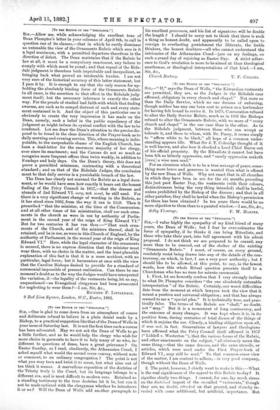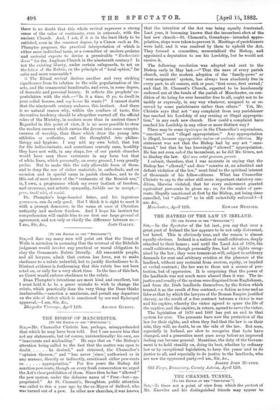[To THE EDITOR OF THE " SPECTATOR."I SIR, — I value highly
the sympathy of my kind friend of many years, the Dean of Wells ; but I fear he over-estimates the force of sympathy, if he thinks it can bring Ritualists, and those who take their part, into full agreement with his adroit proposal. I do not think we are prepared to be coaxed, any more than to be coerced, out of the shelter of the existing "Ornaments Rubric." I must, of course, on every ground, resolutely resist being drawn into any of the details of the con- troversy, on which, in fact, I am a very poor authority ; but I should like to be allowed, at this point, to say, in the feweist words, how this whole Ritual question presents itself to a Churchman who has no turn for minute ceremonial.
1. First, let me honestly confess that I very strongly incline to what Dr. Plumptre considers "the one absolutely untenable interpretation" of the Rubric. Certainly, our worst difficulties date from the moment at which lawyers took the view that it meant a positive and universal obligation ; and that has always seemed to me a "special plea." It is technically true, and prac- tically false. The terms of the Rubric are "shall," no doubt, not " may." But it is a monument of long controversy, and the outcome of many changes. It was kept where it is, in its positive form, during centuries of total disuse of the things of which it enjoins the use. Clearly, a binding obligation upon all, it was not, in fact. Generations of lawyers and theologians have affirmed what the Privy Council itself affirmed in 1857 ("Liddell v. Westerton "), that the various forms of the Rubric, and other enactments on the subject, "all obviously mean the same thing,—that the same dresses, and the same utensils, or articles, which were used under the First Prayer-book of Edward VI., may still be used." To that common-sense view of the matter, I am content to adhere,—in very good company, though without the Dean of Wells.
2. The point, however, I chiefly want to make is this :—"What is the real significance of the appeal to this Rubric to-day ? It signifies chiefly two things. I cannot, for one, lay much stress on the doctrinel import of the so-called "vestments," though they are, no doubt, attacked on that ground, and thereby in- vested with some additional, but artificial, importance. But
there is no doubt that this whole revival expresses a strong sense of the value of continuity, even in externals, with the ancient Church. And, I ask, if it is in the least likely to be satisfied, even in the remotest degree, by a Canon such as Dr. Plumptre proposes, the practical interpretation of which is either mere individual taste, or a committee of modern prelates and sartorial experts to devise a permissible "Eucharistic dress" for the Anglican Church in the nineteenth century? Is not the existing liberty, under certain safeguards, to act on the letter of the Rubric, on the principle of "local option," far safer and more reasonable ?
3. The Ritual revival derives another and very striking significance from its relation to the wide popularisation of the arts, and the ornamental handicrafts, and even, in some degree, of domestic and personal luxury. It reflects the prophets' ex- postulation with the rich :—" Is it a time, 0 ye, to dwell in your celled houses, and my house lie waste ?" I cannot doubt that the nineteenth century endorses this instinct. And there is no natural reason why, within the confines of taste, this decorative tendency should be altogether warned off the official robes of the Ministry, in modern more than in ancient times ? Regarded in this point of view, it is no more possible to stem the modern current which carries the devout into some sumptu- ousness of worship, than those which draw the young into athletics or msthetics, and the thoughtful into philan- thropy and hygiene. I may add my own belief, that but for the indiscriminate, and sometimes scarcely sane, hostility they have met with, in any shape, few of our parish churches would have seen these vestments in any form but that of white linen, which personally, on every ground, T very greatly prefer. But to make this the only allowable form of them, and to deny the use of richer materials, in cathedrals, and on occasion and in special cases in parish churches, and to do this out of mere horror of the "vestments of the Romish use," is, I own, a programme which my every instinct of freedom, and reverence, and artistic sympathy, forbids me to accept,— pace, tanti viri, et antici.
Dr. Plumptre's large-hearted letter, and his ingenious gravamen, can do only good. But I think it is right to meet it with a prompt demurrer, in the name at once of Christian antiquity and modern freedom. And I hope his instinct for comprehension will enable him to see first our large ground of agreement, and not only or chiefly the difference between us.—



































 Previous page
Previous page